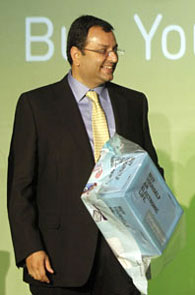Unless new members are inducted at jet speed, the strength of Tata Sons board will come down to four in July.
When Cyrus Mistry joined Tata Sons in September 2006, he was the 11th board member of the unlisted holding company of India’s largest business conglomerate. In close to seven years, Mistry, now chairman, has seen the size of the board shrink to five. And, unless new members are inducted at jet speed, the strength will come down to four in July, when group veteran R K Krishna Kumar retires.
That’s not all. Including the chairman, the Tata Sons board will have just three members - the minimum legal requirement for an unlisted company - when

Apart from Mistry, the two board members who have a relatively long period on the board are Ishaat Hussain and R Gopalakrishnan. While Hussain, the former group chief financial officer, moved to a non-executive role after turning 65 in September last year and is due to retire only in September 2017, Gopalakrishnan, who became a non-executive director in 2010, will retire in December 2015.
“An experienced set of three board members can get things done, if they share clarity of vision,” says Anuj Sah, principal associate at Khaitan & Co, a corporate law firm. Sah, however, adds: “It is generally desirable for large companies to have a higher number of directors on board, to have a better exchange of ideas and quality discussion on critical issues.”
That is the reason why filling the C-suites could be on top of the list of must-dos for the young chairman of the over-$100-billion group that has close to 100 operational companies - a substantial number of these with public shareholding and in diverse businesses.
The task becomes even more challenging, given that the three “internal candidates” - at least according to the speculation in industry circles and the media - will all next year turn 70, the cut-off age for Tata Sons’ board members.
In 2009, the three top veterans - Ravi Kant, B Muthuraman and S Ramadorai turned 65 and moved from their active executive roles as MD and CEO to non-executive vice-chairman at Tata Motors, Tata Steel and Tata Consultancy Services, respectively. It is most unlikely they will join the board as the signal from the corner office is to create leadership for the long term. “We will communicate board-level changes, as and when they happen, and will not comment on speculation,” said a Tata Group spokesperson in an email response to queries sent.
But at least one of Mistry’s moves is no longer in the realm of speculation. The chairman moved decisively last week to create a second tier of top leadership by setting up a group executive council (GEC), under the aegis of the board, to own and drive group-level strategies. With this, the earlier apex executive bodies - group executive office (GEO) and group corporate centre (GCC) - set up by his predecessor, have ceased to exist.
The GCC, which earlier worked on group strategy, comprised board members Krishna Kumar, Gopalakrishnan and Hussain. And the GEO, the body that ensured execution of strategy had Hussain, Gopalakrishnan and Kishore Chaukar (former managing director of Tata Industries). With the new GEC in place, Hussain and Gopalakrishnan will be on the board only in a non-executive capacity. This, observers say, shows Mistry’s preference for creating a long-term leadership pool.
At present, the GEC has only three members - N S Rajan, 51, who has been appointed as chief human resource officer for the group from May 9; Mukund Govind Rajan, 44, the group’s brand custodian and chief ethics officer; and Madhu Kannan, 40, head of business development. All three have been hand-picked by the chairman himself. Tata Sons has already said more GEC members will be appointed “in due course”.
“As the old hands leave and a young leadership team is being created, it would be easy to bring them first at the GEC level,” the head of an HR consultancy firm says. While the group has no dearth of exceptional talent, most are managing directors of their respective firms; giving them dual responsibility (membership of the Tata Sons board or the GEC) may not be a prudent idea, given the challenges companies face because of economic headwinds, HR observers say.
Mistry also has to fill up two critical posts - someone to head the group’s mergers & acquisitions team, a position that fell vacant after Arun Gandhi retired on March 15, and a group chief financial officer, since Hussain retired from an executive role.
The chairman and the new group HR head are certainly going to have their hands full.